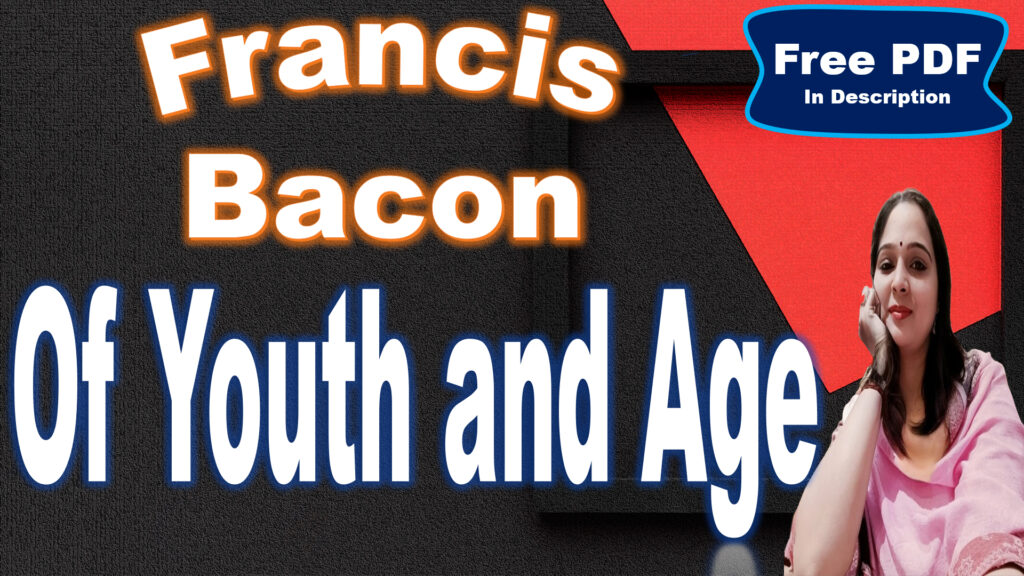
Of Youth and Age Questions and Answers
Very Short Answer Questions
Of Youth and Age by Francis Bacon
Who wrote the essay “Of Youth and Age”?
Francis Bacon.
What is the main theme of the essay?
The contrast between the qualities of youth and age.
What is a key strength of youth according to Bacon?
Creativity and energy.
What is a major weakness of youth?
Impulsiveness and lack of judgment.
What strength does age bring?
Wisdom and experience.
What is a common flaw of older individuals?
Over-caution and hesitance.
What is Bacon’s ideal approach to employing youth and age?
Combining the strengths of both.
Who does Bacon cite as an example of youthful vigor turning into effectiveness with age?
Julius Caesar.
Who is an example of a calm disposition excelling in youth?
Augustus Caesar.
How does Bacon describe young people’s approach to new projects?
Energetic and inventive.
What does Bacon say about older people’s approach to established projects?
Judicious and managerial.
What metaphor does Bacon use to describe impulsive youth?
An untrained horse.
How do older individuals often handle risk, according to Bacon?
They avoid it.
What is a benefit of mixing young and old in endeavors?
Correcting each other’s deficiencies.
What does Bacon say about young men and visions?
They have clearer visions.
How does Bacon describe the learning process between young and old?
Young can learn from the experience of the old.
What is a common youthful mistake in pursuing principles?
Pursuing them too rigidly and without nuance.
How do young people often handle innovation?
They innovate recklessly.
What is a common response of youth to their mistakes?
Refusing to acknowledge them.
What phrase does Bacon use to describe older men’s regrets?
They repent too soon.
What is the primary focus of older men in business?
Consultation and careful judgment.
How does Bacon suggest youth view extreme remedies?
They use them at first.
What advantage does age have in political matters?
Authority and experience.
What advantage does youth have in social matters?
Favor and popularity.
What happens to individuals with early ripeness, according to Bacon?
They fade quickly.
What example does Bacon give of a talent that suits youth but not age?
Fluent and luxuriant speech.
How does Bacon describe older men’s dreams compared to young men’s visions?
Dreams are less clear than visions.
What historical figure does Bacon cite as having books that are exceedingly subtle?
Hermogenes the rhetorician.
What happens to Hermogenes as he ages?
He becomes stupid.
What is Bacon’s overall message about youth and age?
Both have unique strengths and weaknesses, and a balance of both is ideal.
Short Answer Questions
Of Youth and Age by Francis Bacon
What does Francis Bacon mean by saying, “youth is like the first cogitations, not so wise as the second”?
Bacon suggests that the initial ideas (youth) are often full of energy and innovation but lack the wisdom and refinement that come with experience and reflection (age). Just as first thoughts are raw and unpolished, young people often act impulsively and without thorough consideration.
How does Bacon describe the imaginative capabilities of young men compared to old men?
Bacon notes that young men have more lively and divine imaginations, making them more inventive and creative. They are better at generating new ideas and concepts, whereas older men, with their extensive experience, are more suited to judgment and management.
What examples does Bacon provide to illustrate the effectiveness of calm dispositions in youth?
Bacon mentions Augustus Caesar, Cosmus Duke of Florence, and Gaston de Foix as examples of individuals with calm dispositions who excelled in their youth. These figures managed to achieve great success early in life due to their balanced and composed nature.
Why does Bacon believe that young men are fitter for execution than for counsel?
Bacon argues that young men, with their energy and enthusiasm, are better suited for carrying out tasks and initiating new projects. However, their lack of experience and judgment makes them less suitable for providing sound advice and making strategic decisions, roles better filled by older men.
How does Bacon view the errors made by young men compared to those made by older men?
Bacon believes that the errors of young men can ruin business and lead to significant failures due to their impulsiveness and inexperience. In contrast, the mistakes of older men typically result in missed opportunities or delays, as their caution prevents them from taking bold actions.
What does Bacon suggest about the importance of balancing youth and age in employment?
Bacon emphasizes that a mix of young and old people in any organization or endeavor is beneficial. This balance allows the virtues of one age group to correct the deficiencies of the other, leading to better outcomes and ensuring that both innovation and wisdom are applied effectively.
What does Bacon mean by saying that young men “fly to the end, without consideration of the means and degrees”?
Bacon criticizes young men for their tendency to rush towards their goals without carefully planning or considering the necessary steps and processes. This impulsive behavior can lead to mistakes and overlooked details, highlighting the need for experience and strategic thinking.
How does Bacon describe the nature of older men in handling business and decisions?
Bacon portrays older men as overly cautious, prone to overthinking, and hesitant to take risks. They often consult excessively and settle for moderate success rather than pushing for greater achievements. Their cautious nature can lead to missed opportunities and slower progress.
What does Bacon infer from the biblical text, “Your young men shall see visions, and your old men shall dream dreams”?
Bacon interprets this text to mean that young men are closer to divine inspiration, as visions are clearer and more direct than dreams. This suggests that youthful minds have a purer and more immediate connection to creativity and innovation, while older minds are more reflective and interpretive.
What are the potential drawbacks of individuals who mature too early, according to Bacon?
Bacon warns that individuals who exhibit early ripeness may fade quickly. Their early talents can be brittle, and the intensity of their youthful achievements might not be sustainable over time. Examples include those with sharp intellects that dull with age or talents like eloquent speech, which may not age well.





